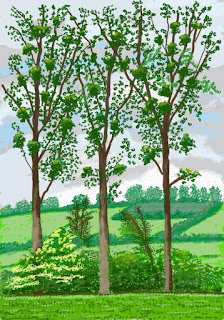O child of God, mother of creation, bond of the universe and its stable link ... you, who by your reins guide the universe, unite all things in a stable and harmonizous bond and wed heaven to earth in a union of peace; who, working on the pure ideas of [Divine Wisdom], mould the species of all created things, clothing matter with form...
( Allan of Lille, Plaint of Nature)
Intuition tells us, and has told us maybe as long as we have been human, that the nature of the world is a great being, the one being in which all oher beings, living and not-living, are joined. And for a long time, in our tradition, we have called this being "Natura" or "Kind" or "Nature". And if we forget, our language remembers for us the relation of "natural" (by way of "kind") to "kindness" and "kin", and to "natal", "native", "nativity" and "nation".Moreover, as understood by Alan of Lille and the poets who descend from him, the being and the name of "Nature" also implicates the history of human responsibility toward the being of all things, and Nature's continuing requirement of that responsibility.
(...)
His concept of the integrity of the natural world, and of the dependence of the world's integrity upon the integrity of human nature, leads by the most direct and simple logic to our own more scientific recognition of the integrity of ecosystems, the integrity ultimately of the ecosphere, and to the recognition (by not enough of us) of the necessity of an ecological ethic.
But a large part of the value of the Plaint is that, though I suppose it is as full as it could be of the biology and taxonomy of its time, it cannot be reduced to the sort of knowledge that we call scientific.It cannot, for that matter, be reduced to the sort of knowledge that we call poetic.It belongs instead to the great Western family of writtings that warn us against what we now call reductionism, but which traditionally we have called the deadly sin of pride or hubris: the wish to be "as gods" , or the assumption that our small competence in dealing with small things implies or is equal to a great competence in dealing with great things.In our time we have ceased to feel the traditional fear of that equation, and we have a world of waste, pollution, and violence to show for it.
(...)
That this is true we may be unable to know until we have understood how, and how severely, we have been penalized by the academic and profesional divorces among the sciences and the arts."
WB ( The presence of Nature in the Natural World: A long conversation (2017))





No comments:
Post a Comment